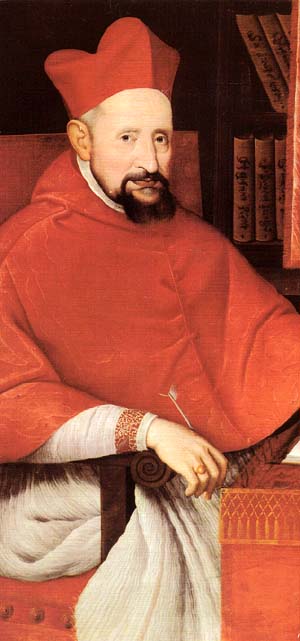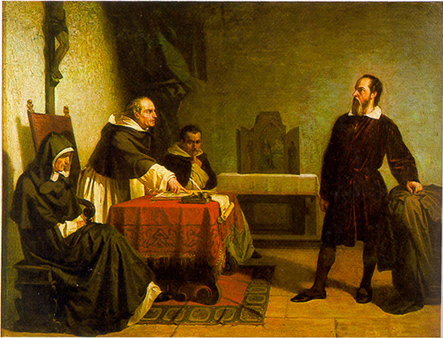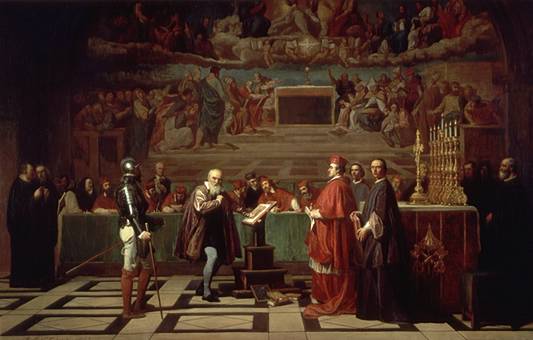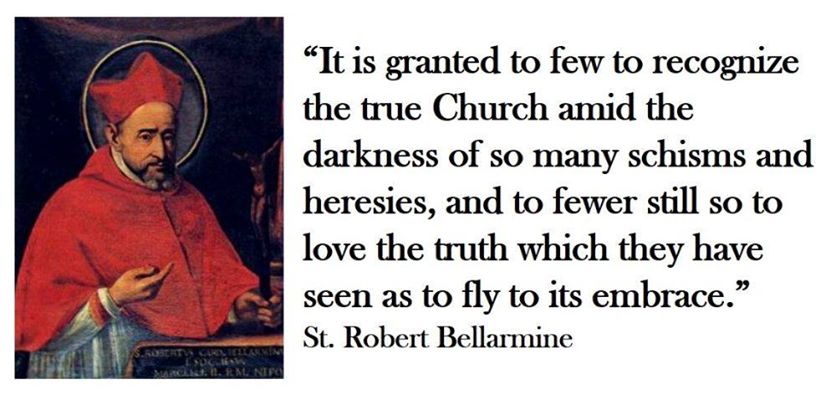When Robert Bellarmine was ordained in 1570, having entered the Society of Jesus ten years earlier, the study of Church history and the fathers of the Church was in a sad state of neglect. A promising scholar from his youth in Tuscany, he devoted his energy to these two subjects, as well as to Scripture, in order to systematize Church doctrine against the attacks of the Protestant Reformers. He was the first Jesuit to become a professor at Louvain.
His most famous work is his three-volume Disputations on the Controversies of the Christian faith. Particularly noteworthy are the sections on the temporal power of the pope and the role of the laity. Bellarmine took a fundamentally democratic tone, insisting power originated in God, was invested in people, and was entrusted to fit rulers. In so doing, he incurred the anger of monarchists in England and France by showing the divine-right-of-kings theory untenable. He developed the theory of the indirect power of the pope in temporal affairs; although he was defending the pope against the Scottish philosopher Barclay, he also incurred the ire of Pope Sixtus V.
Bellarmine was made a cardinal by Pope Clement VIII on the grounds that “he had not his equal for learning.” While he occupied apartments in the Vatican, Bellarmine relaxed none of his former austerities. He limited his household expenses to what was barely essential, eating only the food available to the poor. He was known to have ransomed a soldier who had deserted from the army and he used the hangings of his rooms to clothe poor people, remarking, “The walls won’t catch cold.”
Among many activities, he became theologian to Pope Clement VIII, preparing two catechisms which have had great influence in the Church.
The last major controversy of Bellarmine’s life came in 1616 when he had to admonish his friend Galileo, whom he admired. Bellarmine delivered the admonition on behalf of the Holy Office of the Inquisition, which had decided that the heliocentric theory of Copernicus (the sun as stationary) was contrary to Scripture. The admonition amounted to a caution against putting forward—other than as a hypothesis—theories not yet fully proved. This shows that saints are not infallible.
Technically, all the Church told Galileo was not to teach his theories as fact, nor to publish them as so, which Galileo quickly and immediately flaunted the instructions from the Holy Office. The only reason the Church instructed Galileo so was there was no practical way to prove them in a meaningful way to the illiterate masses, and the Church feared the social disruption this heliocentric new understanding, which on the surface, appears a literal contradiction of Scripture, would immediately cause. A more nuanced understanding of Scripture, and there is no conflict or concern. Galileo, however, was not, as the video below explains, was NOT the smoothest political operative ever, hardly, very badly so. His hard headedness, his arrogance, his lack of political savvy, all make this NOT a scientific disagreement, but one of conflicting personalities and terribly mishandled politics, like ALL wars.
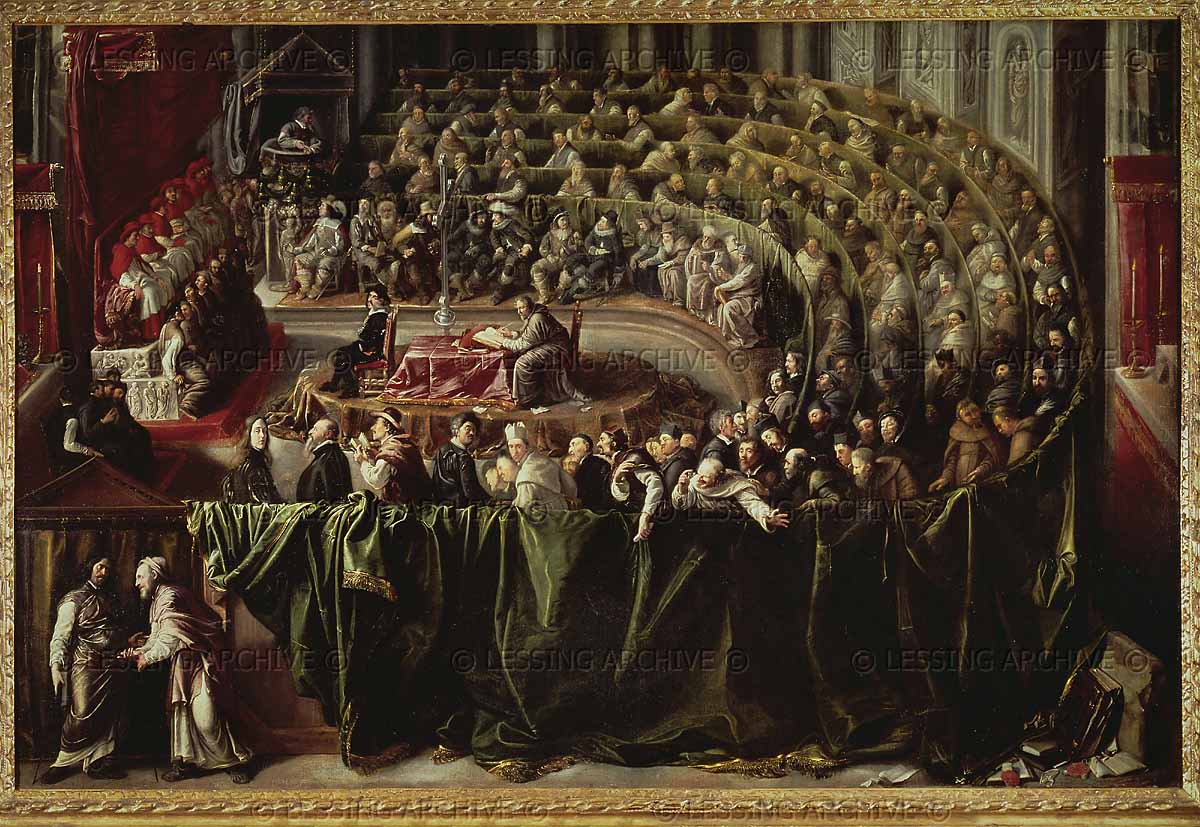
Bellarmine died on September 17, 1621. The process for his canonization was begun in 1627 but was delayed until 1930 for political reasons, stemming from his writings. In 1930, Pius XI canonized him and the next year declared him a doctor of the Church.
“Sweet Lord, you are meek and merciful.” Who would not give himself wholeheartedly to Your service, if he began to taste even a little of Your fatherly rule? What command, Lord, do You give Your servants? “Take My yoke upon you,” you say. And what is this yoke of Yours like? “My yoke,” you say, “is easy and my burden light.” Who would not be glad to bear a yoke that does no press hard but caresses? Who would not be glad for a burden that does not weigh heavy but refreshes? And so you were right to add: “And you will find rest for your souls.” And what is this yoke of Yours that does not weary, but gives rest? It is, of course, that first and greatest commandment: “You shall love the Lord your God with all your heart.” What is easier, sweeter, more pleasant, than to love goodness, beauty, and love, the fullness of which You are, O Lord, my God?” Is it not true that You promise those who keep Your commandments a reward more desirable than great wealth and sweeter than honey? You promise a most abundant reward, for as your apostle James says: “The Lord has prepared a crown of life for those who love Him.” What is this crown of life? It is surely a greater good than we can conceive of or desire, as Saint Paul says, quoting Isaiah: “Eye has not seen, ear has not heard, nor has it so much as dawned on man what God has prepared for those who love Him.”
– from “On the Ascent of the Mind to God”, by Saint Robert Bellarmine, SJ
“The human soul has so much likeness to God its creator that I surely know of no other way by which one can more easily mount to a knowledge of God than from reflection on one’s own soul.”
–St. Robert Bellarmine
“The school of Christ is the school of love. In the last day, when the general examination takes place … Love will be the whole syllabus.”
–St. Robert Bellarmine
“When we appeal to the throne of grace we do so through Mary, honoring God by honoring His Mother, imitating Him by exalting her, touching the most responsive chord in the Sacred Heart of Christ with the sweet name of Mary.”
–St. Robert Bellarmine
“Charity is that with which no man is lost, and without which no man is saved.”
-St. Robert Bellermine
O God, in order to defend the faith, You endowed St. Robert, Your Bishop, with wondrous erudition and virtues. Through his intercession, grant that Your people may ever rejoice in the integrity of that faith. Amen.
God our Father, You gave Robert Bellarmine wisdom and goodness to defend the faith of Your Church. By his prayers may we always rejoice in the profession of our faith. We ask this through our Lord Jesus Christ, your Son, Who lives and reigns with You and the Holy Spirit, one God, for ever and ever. Amen.
Love,
Matthew

